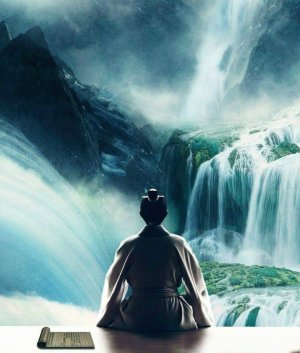
The perfect comedy to cure your drama hangover/withdrawal
What an unexpected delight! This show is loaded with laughs and parodies of common costume drama tropes. It's so silly yet funny that you will pay no attention to its less than stellar plot.This is the perfect change-up to cure your drama withdrawal as its silliness and hilarity is sure to break the trance. Best of all, there should be no concerns about whether the plot will suck, angst, unsatisfactory ending, and all that nonsense. Just laugh along for the ride and get off investment free if the funny stops.
Also kudos to the FL for not afraid to look ugly occasionally for the lols.
7.5 (+1.0 MDL inflation)
Was this review helpful to you?

This review may contain spoilers
Moving mountains, one muddy step at a time
‒Overview‒If you are wondering whether to watch 'She and Her Girls', hesitate no longer, queue up the first episode, and prepare to lose yourself in this captivating story. Even if this isn't your typical genre and the synopsis lack the usual fantasy or glamor, you will find a hidden gem whose unvarnished substance outshines any gilded tale. In this drama you will find a timeless, universal story about the dogged spirit of a headmaster and her equally tenacious girls, who are changing the lives of others and their own in the most impoverished and anguished of circumstances. Along the way, you will fall in love with the stellar acting, production, organic comedy, emotional moments, and most of all, the touching group of individuals who made the impossible, possible. For many viewers, not only will this be an excellent introduction into the world of serious, 'proper' CDramas, it may even secure a spot among the top dramas of 2024, if not all time.
‒Review (modest spoilers)‒
You are 14 years old, one of the top students of your class. You are hardworking, responsible, with a whole life ahead of you. What do you do as the high school years approaches? Attend fun summer camps, hang out with friends, engage in hobbies and sports, or party and do teenager things? In Gu Yu's case, you drop out of school, work from dawn till dusk until your face and clothes is creased with mud, raise your sibling, pigs, and your pig of a drunkard dad, and prepare to sell the rest of your life for the bride-dowry of 30,000RMB because that's the brightest path in your future.
Such is the life of girls in the villages of Huaping, a remote, impoverished region in China's Southwest. Secluded from the cities by barricades of mountains and forest, most residents of Huaping have never been outside of their villages. For all they know, the only thing beyond the mountains are just more mountains. Modern facilities appear decades away, the same for modern values. Girls are often married off at age of 14, become mothers not long after, and spend their life not much different from the livestock they raise. If they are fortunate, they will have married a decent man, who will toil alongside her, and the cycle repeats. And if they are not fortunate, the husband will be abusive in all sorts of pre-modern ways, and the cycle repeats. To change the lives of these girls and villages is a herculean task of moving the mountains of ragged poverty, stultified structures, and ingrained mindset. Behind each mountain, are only more mountains.
And that's the crusade of Zhang Guimei, a no-nonsense teacher transplanted from the Northeast to Huaping. She had lived in Huaping for too long, and seen too many girls cut their education and future short. Too many parents pull their girls from school at the end of their 9 year compulsory education, and sometimes before then. If a family had some meager resources, they would use it for the education or dowry of their sons. By tradition, a girl's role was to be a wife and mother, the sooner the better, and education only got in the way. Zhang Guimei knew that the only way to give them a fighting chance was to open up a completely free high school for the girls. One that offered not only free tuition, but also meals, board, and living expenses. One that would not only have the girls graduate high school, but also prepare them to succeed in China's notoriously cutthroat Gaokao college entrance exam, so that they could finally scale the mountains and see the world beyond.
With unnerving stubbornness, she begins to move mountains. She hounds dropout students, cajoles skeptical parents, begs and coerces local officials just to get the school constructed. Then came more mountains: attracting teachers to such a grueling and hopeless job, keeping the school running as they scrummage for funds, leading the group of overworked, burned out teachers. And moving the biggest mountain of them all‒marshalling the under-schooled students through the long march to Gaokao, while they are outgunned in every dimension and frequently ambushed by family turmoil. But as she moved mountains, the minds and hearts of others begin to move as well. Soon, she would be joined by a tenacious group of teachers, officials, parents, and most importantly, the 100 precious souls in the initial class of Huaping Girls School. Each battling their own struggles, each a heroic inspiration. As they stumble through the muddy hills of Huaping, literally and figuratively, mountains are slowly moved, one after another.
She and Her Girls is a triumph of the individual spirit melded into an even stronger collective. The remarkable story on-screen is mirrored by the collective performance of a superb cast, for whom many recognitions and accolades await. This is the kind of drama where you are convinced the villagers walked onto the set and doubt how any of them could be actors. There are too many excellent performances to list, so I will only highlight a few notable ones. First and foremost, Song Jia (宋佳) as Zhang Guimei (张桂梅) seamlessly embodied the mannerism and personality of the real-life Zhang Guimei‒one who is stern, quick-tongued, stubborn, but also profoundly warm-hearted and devoted. The other best performance no doubt goes to Lan Xiya (兰熙雅) as Gu Yu (谷雨). Portraying the 15yro Gu Yu, the 25 yro Lan Xiya's performance was simply flawless. This is an extremely challenging role for any actress to play, and I'm still astounded how she pulled it off. The two government officials‒Zhou Shanqun and Ma Yongqiang‒played by Nie Yuan and Jiang Chao were predictably excellent in portraying the aura and mannerism of do-good officials who are nevertheless balancing competing demands in the system. Among the teachers, I was most impressed by Chen Sihai, the school administrator played by Zhang Tianyang, and Wei Tingyun played by Huang Miyi, who might be mistaken for a Zhou Xun doppleganger as she brings the soothing etherealness of the famed actress.
The production, writing, cinematography, editing, and music complete the all-round excellence. Each episode seamlessly balances laughter, emotions, and a gritty, realistic window into the triumphs and travails of the characters and society. There was no lull or filler to be found and I binged through 23 episodes in just a day and half (granted I watch all shows on 2X speed nowadays). As someone who would rate most 8.5+ MDL shows below 7, my overall rating is 8.6 (adjusted to 9.5 for MDL). This is most certainly a top 5 CDrama in 2024, and one of the best school, youth, rural China dramas of all time. For reference, the typically stingy Douban gave this a 9.4 on over 100k votes, likely crowning this as the 2024 rating champ. (This concludes Part 1 of my review. I hope to continue with a part 2, that goes into my very picky critique of the show and some relevant cultural observations.)
--Category Ratings--
- Overall - 8.6
- Plot / Execution - 8.5
- Theme / Concept / Impact - 9
- Acting - 9.2
- Visuals - 8.5
- Audio / Music - 8.5 (bonus for local dialect and undubbed recording)
- Rewatch - 8.5
- Accessibility - 7.5
- Subtitle quality - 8 (some platforms are better than others)
Was this review helpful to you?

Crouching Lianhua, Hidden Xiangyi
Who are you ... and who do you want to be? The question of identity is the driving force behind the motivations of the characters and the story. It's also the key attribute that made this show a very enjoyable watch. Mysterious Lotus Casebook (MLC) stuck to a clear identity. It's a bromantic (no BL) adventure seasoned with humor, intrigue, and heartfelt moments. While this may not sound like such a revolutionary concept, MLC deserves praise as much for delivering on that setup as for what it didn't do‒sabotaging the story with aneurism-inducing fillers and hackneyed tropes.**Ex-Sective Summary** (for the Sect Leaders busy plotting Jianghu conspiracies or watering veggie garden):
--Why you should watch:
1) interesting, likeable, and consistent main characters with decent casting and acting;
2) Intriguing story, flowing pace, polished production, and steady tenor/mood;
3) solid bro-mistry and no hos to come before/between them. Seriously, if you are grossed out by all the gratuitous romance derailing otherwise reasonable plots, this shows steers clear of it.
4) But even if you are a romance-junkie, you will still love it, as demonstrated by the numerous testimonials in comments and reviews ... and because you're a Bossbabe that needs no romance.
5) Steady diet of wuxia action not sullied by horrendous CGI or amateurish choreography.
--Why you shouldn't watch:
1) You are a romance-zombie that must MUST feed on the brains of hetero lovers. Or innocent bromance just doesn't quite scratch your BL fujioshi itch.
2) You love procedurals and actually want to watch for the case-solving. They are not the core of this show, but mostly just serve as plot device.
3) You want NiF level strategy/plot, Joy of Life level (for native speaker) humor, or classic Wuxia style fighting. Sorry MLC will likely fall short.
All in all, this is fun, easy watch that most audiences of this site will enjoy, even if this isn't your typical genre.
PS: I may return later for a deeper dive into why this drama is more Li Lianhua than Li Xiangyi. And if you think my scoring is too low, just add +2 to please your soul.
Was this review helpful to you?

A celebration, eulogy, and reliving of youth
‒Overview‒Wind Direction is an exceptional youth drama that begins in the carefree wonderland of youth and ends in the bittersweet nostalgia of adulthood. The show draws you in with the youthful hijinks of its endearing young characters and takes you through the world of their parents and their own journey towards adulthood. Along the way, you will be laughing, fuming, crying, and learning with the characters.
While this show may have flown under the radar, don't hesitate to give it a try and let it grab you along for the ride. It could very well become a top youth drama that will stay with you for a long time.
‒Review‒
Like the typical youth drama, Wind Direction delivers plenty of laughs, cuteness, innocence, and friendship. But the show also goes far beyond that to deliver the profound, sometimes painful, but inevitable lessons that one can't avoid in life. The show is written with all the love of a letter to a younger self, with the fondness for the innocent days and the tough-love advice from lessons learned along the way. The Chinese title of the show is 迎风的青春, which has an extra layer of significance. It refers to the days of youth that's facing the wind, a nod to the characters embracing the world, and also to the opportunities and surprises that will be blown toward them.
The show starts out deceptively simple and innocent, and may not seem all that remarkable compared to the typical youth drama. Unlike Go Ahead, which is another favorite, we are not treated to immediate tension and conflict for the quartet of friends. But the show moves along methodically, almost sneakily, to weave together an ever richer tapestry of parents, classmates, teachers, and events that accentuate the theme of each episode. Tensions and mysteries that are introduced fade in and out of view like sections of a symphony. And the director always finds the perfect time to queue up the next big revelation in an unpredictable, yet fitting manner. Pretty soon, you find yourself cheering on a superb ensemble of characters,
crescendoing toward a dramatic finish.
There were so many superbly written and acted characters in the show in addition to the childhood friend group. There's the affable and understanding dad, played by Tian Yu, or more famously Wang Qinian from Joy of Life. He's married to Jia Daiyu (Liu Lin, LLTG and other shows), the firecracker Mom that's ready to give anyone an earful. There's Li Dahai, played by the always fierce-looking but funny Jia Bing. He's the short-tempered Dad ready to give his son Li Si an instant beating. There's Jia Baoshan, the man-child uncle that's always getting into trouble. And last but not least, there's Xiao Fang, the principal portrayed by the effervescent Jackie Li who steals scenes left and right.
The show culminates in a dramatic last six episodes that will tug at your heartstrings. For some, these episodes may be a surly wake-up call from the delicious revelry of youth, an abduction into adulthood, and the death of innocence. That's a completely understandable and natural reaction. But I encourage you to take a deep breath and embrace the pain, tragedy, and bittersweet moments. Because these episodes are the highlight of the show. These are the indispensable reminders that the show unyieldingly imparts, to those who has already traveled the road, and those who have yet to travel it, but eventually will, one way or another. And on the other side, you could recover the new you‒with a newfound appreciation for the innocence of youth, safeguarded and cherished in the memorial of your heart, powering you through the storms and scars suffered along the way.
And that's the spirit of Cheng Yaya, Yuan Shanqing, Qiang Xiaowa, Cheng Miaomiao, and Li Si. To bravely sail across the ocean and into the wind, even as they are soaked, battered, and blown off course. They are waiting for you on the other side, will you come along for the journey?
‒Component Ratings‒
> Overall [8.5 ‒> MDL 9.0] - One of my favorite watch of the year, last 6 episodes bumped it to 8.5 for me, same score as Go Ahead.
> Plot [8] - Logical and engaging, excellent pacing with no fillers
> Theme / Concept / Impact - [8.5] - A moving commemoration of youth with profound lessons along the way
> Acting [8.5] - solid acting from the younger actors that were further elevated in final episodes, veteran cast also excellent
> Visuals [8.5] - production, shots, camera language, aesthetics, editing were all pleasing and cohesive
> Audio [8] - live recording not dubbed, appropriate and moving music and sound effects, though few memorable tracks
> Rewatch [8.5] - excellent rewatch option for the comedy, comfort, and heartfelt moments; episodes can be watched independently though you may find it difficult to stop
> Accessibility [8] - the youthful friendship will have easy universal resonance. Though to fully appreciate the story of the parents and parent-child relationships may require understanding of cultural context.
> Subtitle quality [8.5] - The few episodes I saw with subs were excellent and surpassed my expectations in representing the vibe and colloquial speech.
Was this review helpful to you?

Good payoff for low time investment
For those that detest long, trope and filler-laden dramas, At the Moment is a good antidote that deliver interesting short stories without the exasperation. The drama is an anthology of 10, loosely connected love stories set in the Covid era of Taiwan. With a star-studded acting lineup featuring many of the notable names in Taiwan entertainment and solid production, the show definitely delivers on the technical side. And for those who are tired of fake-looking kissing scenes, the drama delivers pretty realistic kissing and intimacy scenes. Though due to the short length of each stand-alone episode that's less than an hour, many viewers may miss the deeper connection, complicated plot, and greater runtime of a typical drama.Since the episodes are so short, I will only provide my rating for each episode rather than a review that will inevitably be full of spoilers. Overall, I enjoyed the earlier episodes more than the later ones. I think this is partly due to the novelty and vibe of the format wearing off toward the later episodes as some of the stories felt less unique and repetitive of the general vibe and formula of the earlier episodes. Several of the love-stories also felt more hollow as we are not shown the strong and intricate reasons why the characters would suddenly fall deeply in love with each other, some may be hinted but much is left to viewer extrapolation or imagination.
👍Ep1 - 8; 👍👍Ep2 - 8.5; 👍👍ep3 - 8.5; 👌ep4 - 7.5; 👌ep5 - 7; 👌ep6 - 7; 👌ep7 - 7.5; 👍ep8 - 8; 👌Ep9 - 7; 👌Ep10 - 7
***Component Ratings***
✔️ Overall - 7.5 + (0.5 MDL bump) --> 8.0
✔️ Plot - 8
✔️ Theme / Message / Impact - 7.5
✔️ ✔️ Acting - 9
✔️✔️ Visuals - 8.5
✔️ Audio - 8.5
✔️ Rewatch - 7.5
✔️ Accessibility - 8
✔️ Subtitle quality - ?
Was this review helpful to you?

For idol dramas lasting longer than 3 hrs ... seek immediate medical help.
A Familiar Stranger is a historical costume drama revolving around 2 FLs and 2 MLs. One of the pair is the good couple, the other, not so much. And due to some ancient Chinese face swapping magic, the identities get all twisted for the FLs, and we get a romance-thriller type of story as audience try to figure out what's the goal, motivation, and the real identities behind all this plotting. Along the way, we get a story packed with plenty of dramatic moments, skinships, and heady tropes orchestrated without the filler.**Full disclosure: this was my first mini-drama and one of the few idol costume romance shows that I've attempted. Idol romance is not an offering that I can normally stomach, but I pulled the trigger because of its short length‒18 x 10min episodes for 3 hours of total runtime. Compared to the standard bloated 40 episode 45 minute ordeal, this was doing penitence at 90% off.
Despite seeing decent ratings and good reviews, I was not expecting much. I was already wary of big budget idol dramas, and was prepared for worse given the nature of mini-dramas‒tiny budget, hastily shot, and inexperienced actors. To my surprise, this show actually packed enough story content to rival full length dramas and offered decent production quality and acting to match. That's not to say the story is a masterpiece by any stretch of the imagination. But for its intended audience and aim, A Familiar Stranger offered plenty of romantic moments, heady tropes, a lively plot, and plenty of eye-candy. It also answered an important scientific question that had been puzzling me‒how much idol romance drama can I stomach before the vomit just ejects out of me? Turns out, I'm definitely strong enough to go 180 minutes. And at 10% runtime, it also answered an important corollary, which is that 80-90% of the story in idol dramas are mostly brainless fodder and fluff.
Now if you are into the fluff and like the full-length ones, more power to you. Different strokes for different folks. But for those who dread the fillers, slow-pacing, and length of cdramas, these quality mini-dramas may just be your thing. And as an added bonus, these often feature a lot more chemistry, passionate scenes, and skinship than the standard dramas that face tougher censorship scrutiny.
As an aside, the business aspect of this show was one of the most interesting aspects. By having the 2 FLs face swap with each other, the script allowed both to showcase their acting chops for the 2 most common roles in cdrama‒the innocent girl and the evil girl.
**Notes and Musings**
1) ML has the most gossipy and useless military advisor.
2) The fearsome ML general also has the most porous mansion security, bad guys and unwelcomed guests roam around undetected, while the maids keep catching ML/FL at the most inconvenient moments.
3) A lot more skinship and intimate scenes compared to the usual dramas, must be laxer censorship around mini-dramas.
**Category Ratings**
Overall - 7 (+.5 MDL inflation)
Plot - 7.5
Theme/Message/Impact - 7
Acting - 7.5 The leads did a decent job for the purpose of the show
Visuals/Production - 8 looks pretty good for the budget
Audio/Music - 7.5 Sound gets muted occasionally for the YouTube version
Rewatch - 7
Accessibility - 8 Easy to understand plot and tropes
Subtitle - 8.5 Surprisingly polished subs that delivered the meaning and dialog quite well. Even the OST lyrics had decent translations.
Was this review helpful to you?

I Am ... Feng Baobao's Slave
Easily one of the top shows of the year. Watch for the tight story, vigorous pacing, excellent acting, dazzling action and cinematography. And most of all, the nonstop hilarity that will make you laugh so hard that you beg for mercy.All this would not be possible without Feng Baobao, the star of the show and one of the most iconic and badass female characters, ever.
My review is short because MDL lost my review. Will rewrite it later.
Rating: 9 + 0.5 (MDL inflation). Hoping the show finishes with a bang.
Was this review helpful to you?

To see the Altai clearly
To the Wonder, or My Altai, is a breathtaking cinematic treasure that takes the viewer to lush scenery of the Altai region in China's Northwest Xinjiang, predominantly inhabited by pastoral Kazakh herders. Each frame is aesthetically pleasing and invokes the pristine expansiveness of the region and a simple lifestyle that's rooted in the land and tradition. The actors deliver documentary-like performances where the Kazakh language is widely used. The well-known actors such as Ma Yili, Yu Shi, and Jiang Qiming were all quite impressive. Just as terrific were the ethnic Kazakh actors that embodied their roles with casual aplomb.At just 8 episodes, the show journeys through the landscape at an idyllic pace, always moving, but at a deliberate enough pace to enjoy the beauty of the land and people. The show explores the tension between traditional and modernity, between a semi-nomadic pastoral lifestyle and greater opportunities in the cities, between the older and younger generation. In many ways, despite the radical difference in landscape, these themes are also ever-present throughout China, as over a billion people grappled with breakneck transformation whether they are in the cities, villages, or remote mountains. And here, the director does a tremendous job in depiction that these themes feel as if they are a part of the land, like a galloping horse pack or a winding stream. The show is clearly a work of respect and love for the region in how everything was depicted with care.
Everyone should check out this show, if for nothing else just to experience the type of serenity and peace that's becoming ever rarer in the world today.
‒Criticisms: You Don't Belong Here‒
The drama is so beautiful and soothing that I almost feel guilty giving criticisms. It's as if I'm deviating from the impeccable tranquility to deliberately miss the forest for the trees. It's as if I'm leaving a piece of plastic garbage that doesn't belong to the Altai. So stop reading if you want a unmarred viewing experience, as this is an exceptional 10/10 show for many people. In fact, I strongly recommend you to watch first, then read my critique later. As even delving into my issues with the show and expounding on them sullied my impression quite a bit. For some shows, it's important to know about issues ahead of time. But for this one, it's unnecessary and going in with an inspector's glass will only degrade the experience. Anyways...
My biggest issue is that the female lead also doesn't seem to belong here, in the Altai and in the show. I'm perfectly fine with the setup of a younger girl that grew up far more in the nearby city than in the pristine Altai. After all, the show is based on essays of the author reflecting on her own experience. My issue is that Li Wenxiu as portrayed by Zhou Yiran even stretches the believability of her character setup as a talented writer of that time period. It's as if LWX is from Shanghai, 20 years in the future. Indeed, her character is portrayed in very similar mannerism and disposition in Song of Life, where she plays a hipsterish, somewhat spoiled and dramatic young girl in Shanghai. That worked well then, but feels very out of place here. I found it very difficult to understand how she can grow up so sheltered and airheaded when her mother ZFX has such no-nonsense rustic personality. Such behavior would be rare in most places in 2000s China, much less given her background.
Moreover, most talented writers are observant, pensive, and reflective. LWX exhibited few of those qualities or the intellectual depths that can uphold her writer characterization. Instead, she spent a lot more time pouting, giving unsolicited advice, being lovestruck, and getting herself into trouble. Maybe the script is partly responsible, but I suspect a big part of the responsibility goes to ZYR's acting, where she's channeling too much of a modern girl than someone of her ostensible background. Moreover, she starts out like she didn't belong, which is forgivable and expected. But she finishes the show mostly the same, still looking out of place. Hell, she's more believable as a BL fanfic writer on MDL, sorry to 85% of you. I like the fact that she's an average and natural looking actress that CDramas desperately need more of, but I suspect there are many under-the-radar actresses who could have done a better job. And as one of the leads, she became a plastic garbage bag constantly floating in view, too unsightly to be ignored.
My second biggest issue is that I'd like even greater focus on the local herdsmen, their struggles, and perspectives. The drama does a commendable job for respectfully presenting their experiences, but I'd have preferred the whole show to be about them, as that was the most interesting part. Perhaps with LWX out of the way, that would be possible. On a lot of the themes, we only scratched the surface of tensions caused by change in the Altai. I wanted deeper reflections and more substantial resolutions.
Overall, I rate it 7.6 (initial impression before writing review was closer to 8) ‒> MDL 8.5. The visuals were easily a 9. And without the aforementioned issues, the show could have been 8 or 8.5 for me.
‒Category Ratings‒
- Overall - 7.6
- Plot - 7.5
- Theme / Concept / Impact - 8
- Acting - 8.5 (9 without ZYR)
- Visuals - 9
- Audio / Music - 8
- Rewatch - 7.5
- Accessibility - 8
- Subtitle quality - 8
Was this review helpful to you?

This review may contain spoilers
Get some money, make some money ... scared money don't make no money
‒Overview‒Escape from Trilateral Slopes is a pulse-pounding thriller that's also a valiant departure from the usual CDrama genres. Set in the notorious Golden Triangle of Southeast Asia known for all kinds of illicit trades‒drugs, gems, weapons, and people‒Trilateral Slopes breaks new ground in delivering the raw brutality of the criminal world. For those not squeamish about violence, the show is an exemplary showcase of superb visuals, acting, and storytelling. Definitely a top show well-worth checking out.
‒Review (minor spoilers)‒
Set in the tropical jungle of Southeast Asia, our happy go-lucky main lead Shen Xing, played by Guo Qiling (of Joy of Life), is trying to explore this exotic new country while earning some money working for his Uncle's construction company. But it didn't take long before his uncle goes missing trying to retrieve money and Shen Xing is thrust into the criminal world of Trilateral Slopes where he must find money and his Uncle while trying to dodge death at every turn. His saving grace came in the form of Uncle Cai (or Cai Shu), a calm, calculated, and charismatic criminal mastermind who operates a key logistics service in Trilateral Slopes. Seeing Shen Xing as an useful subordinate, he soon began mentoring and dispatching Shen Xing to various jobs, taking him through a guided, but still deadly tour through the various criminal enterprises of Trilateral Slopes. In the process, Shen Xing is confronted with the moral dilemmas from his dealings with the people, the gangs, his crew, and his own conscience.
The show is an invigorating escape from the triple failures‒bad visuals, bad acting, and bad story‒that plague so many cookie cutter Chinese idol dramas. Rather than waterboarding you with tropes, it serves up exquisite film-like sets and visuals that evoke the quality of blockbuster cinema. The jungle landscape, exotic animals, the blend of languages, and range of people from the downtrodden populace to the psychotic criminals create an experience of being dropped into a war-torn dystopia. Forget the cheesy-looking fake blood and soft punches, the criminals here punch, stab, explode things with concussive force and sadistic glee. Moreover, the show does a great job to make the world feel expansive as you are taken through a variety of regions and locations, each with its profitable trade and deadly secrets.
But the world of Trilateral Slopes can only feel so alive thanks to the excellent actors that simply embody their characters. We have one of the most decorated HK actors in Francis Ng, whose portrayal of Cai Shu effortlessly oozes charisma and gravitas. The other criminals leaders are also deftly portrayed by veteran actors. Other younger actors such as Jiang Qilin (Dan Tuo), Jiang Qiming (Wang Anquan), Zhao Runnan (Guo Liming), and Qi Xi (Liu Jincui) also left spectacular performances. Even the random background actors were a sight to savor. The show not only uses live-recording, but the actors even deftly employ a language constructed just for the show, contributing greatly to the immersion.
Unfortunately, the excellent all-around acting comes with a unsightly caveat, which is the male lead. Despite his crowd pleasing comedic performances in shows such as Joy of Life, Guo Qilin delivers some of his most nuanced performances here, but is still outclassed by the stellar cast around him. While he's able to comfortably portray the frightened, naive Shen Xing in the early parts of the show, his limited range and subtlety makes his character growth and moral struggles less than compelling. In an average drama he'd suffice, or even be praised for his acting, but here he sticks out like the lone actor in a documentary. To a lesser degree, this is also true for Wang Yuwen and Jiang Peiyao, two actresses who continue to improve by taking on challenging guest roles in this drama. While they have great scenes, there are still brief moments that betray them as actors.
The storytelling was another major highlight as the writers methodically guided the viewer through the land with themed episodes traversed not only locations, but criminal enterprises and moral questions. As your horizon expands, all the illicit puzzle pieces get assembled together and all the moral dilemmas culminates in a moment of life and death, for Shen Xing, his crew, and his friends.
This was an excellent story that kept me engaged from start to finish. However, there are aspects that can be nitpicked and improved. First, while the show aimed for a climactic finish, some chapters in the second half lacked the urgency and intensity of the earlier episodes. The usual brutal assortment of drugs, greed, and conflict served as a pacemaker that went silent before the eventual climax. Second, Shen Xing’s character development could have been better. A more complex Shen Xing would have balanced his decency with the shrewdness and occasional callousness required to survive in Uncle Cai’s world. At times, his simplicity stretched believability. In such a brutal environment, where only the strong and vicious survive, I often wondered how someone so green could serve as a trusted lieutenant of Uncle Cai rather than road kill for all the predators that roam the jungles.
Finally, the show could have been more defiant about what kind of story it wanted to tell. If it was about confronting the brutality and evil in a chaotic world, the show could have built up to a different kind of dramatic ending of loss and betrayal, perhaps by those who are the closest to Shen Xing. If it wanted to focus on the moral complexities and inner struggles, we could have created a road to perdition for Shen Xing where he must struggle more furiously against moral dilemmas and inner demons, perhaps leading to a journey of discovery, reflection, and redemption. Alternatively, if the show wanted to make commentary on how we are powerless victims swept up in a world of chaos, or about the complex cycles of crime, poverty, and instability in war-torn countries, it could have done that as well with a greater focus. Instead we are seduced with pieces of each of those themes, but not given the full meal. Perhaps censorship is part of the problem as a morally compromised Shen Xing may not pass review. Yet the show has pushed enough boundaries that leaves me wondering about what could be made if the crew had a completely free hand, or had done more to portray complex themes in such a fascinating setting.
Despite these critiques, Escape from Trilateral Slopes offers a compelling narrative and a visually stunning experience, with standout performances that elevate it above many other shows in its genre. Whatever criticisms I have arise from thoughts inspired by such rich and visceral worldbuilding. My overall rating is 8.3 (‒> 8.5 MDL), likely landing this as one of the 10 best CDramas of 2024.
--Category Ratings--
- Overall - 8.3
- Plot - 8
- Theme / Concept / Impact - 8.5
- Acting - 9
- Visuals - 9
- Audio / Music - 9
- Rewatch - 8
- Accessibility - 7.5
- Subtitle quality - 8
Was this review helpful to you?

A Familiar Idol Drama
In many ways, familiarity is an recurring element for Kunning Palace. The FL was an Empress of evil deeds in her past life that transmigrates into a do-over life, intent on fixing her mistakes. So the setting, the people, and even many events are portrayed as familiar events that add tension to the story.As for my personal viewing experience, Kunning Palace also felt familiar‒A Familiar Stranger familiar. In fact having conscientiously avoided idol dramas‒costume or modern‒A Familiar Stranger was an rare exception that I attempted and enjoyed, perhaps mostly owing to its short mini-drama length. With Kunning Palace as the much anticipated big-budget drama, I joked to myself that all I'm looking for is AFS quality and I'm willing to turn my brain off for the ride. And to my cursed prediction, A Familiar Stranger is basically what I got: from the haphazard blinding lights, to the spinning shots, to the predictable OST that conspicuously serenades every modestly emotional scene, to the paper-mache world-building and story that I didn't dare staring into for the fear that even a lingering glance will set the whole world ablaze.
And sadly despite the modest expectations, I'm not sure if Kunning Palace matched the quality of AFS. Despite being a low-budget production shot in a pinch, AFS had arguably better production quality, better average acting quality, and better tropey romantic sizzle. And most of all, the short 3 hour run time and fast pace made all the irksome issues much more palatable.
To be fair, Kunning Palace is not a terrible show, and solidly above average for an idol drama. Unsurprisingly, a lot of people liked it, and liked it a lot. If you are not congenitally allergic to idol drama like me, the sets, costumes, pretty actors, and decent trope execution will be lighting up plenty of dopamine and serotine. And just some modest improvement to the script, acting, and cinematography would have made this a decent watch me. But as it is, the negatives slightly outweighed the positives, and multiplied by 24 episodes the cumulative enjoyment debt had become too much to overcome.
Complaints:
❌Kiddie level political schemes and too many plot issues
❌On-the-nose tension and dramatic moments, reinforced by even more on-the-nose dialog to make sure the audience understood the obvious
❌Too much try-hard acting; too modern line delivery, dialog, and general vibes
❌Amateurish cinematography and editing choices, the director feels like someone that likes to inject random effects into his Powerpoint slides to look professional
--Category Ratings--
- Overall - 6
- Plot - 5.5
- Theme / Message / Impact - 6
- Acting - 6.5
- Visuals - 7
- Audio - 7
- Rewatch - 5
- Accessibility - 7.5
- Subtitle quality - 8
Was this review helpful to you?

Play spy games, win spy prizes
‒Overview‒Spy Game is a riveting spy thriller that has many terrific aspects that makes it worth watching. The acting is excellent and features a star-studded lineup, with slick action sequences and a fantastic performance by Wang Likun. The plot is tightly-paced and features many well-executed twists and turns. The cinematography and production is considered and high quality. And the icing on the cake is the razor sharp dialogue that's subtle, intelligent, and evasive, delivering the immersive tension of witnessing the high stakes spy vs. spy maneuvers. That said, there are a few elements that may be off-putting to some viewers. The setup of the drama is based on a spy organization that recruits real-life agents through a virtual game. If you accept the setup and not fuss too much about the CGI in the virtual world, you will find a surprisingly engaging drama. On an additional note, I was initially weary of how much propaganda element there might be in the drama, but it actually turned out to be minimal and the bad guys were all depicted as intelligent and with reasonable motivations.
‒Review‒
This was actually my first full-length drama that I really enjoyed this year. At the time, I had suffered through 6 months worth of uninteresting releases and abandoned disappointments. I picked this up mostly as a masochistic for-science exercise to see how quickly brain-dead propaganda would force me to drop the show. This was produced with assistance from China's MSS (Ministry of State Security) after all, an agency similar to the CIA/FBI. To my surprise, after a few initial lukewarm episodes, I was captivated by the intelligent script and dialogue delivered by a terrific cast lineup. My only regret is that I wanted to write an in-depth review and hence delayed it and now I can only put down a fraction of my impression about the show.
The show starts out simple, and even a little cheesy with the virtual game world. It quickly becomes apparent that the virtual 'Spy Game' is actually a recruitment tool for a real spy ring working for some shadowy foreign organization. Two of our main leads, Huang Zicheng, played by Wei Daxun, and Yao Yao, played by Li Yitong are quickly caught up in their first mission and get entangled in a plot to steal cutting edge R&D. And luckily or unluckily for Huang Zicheng, his adoptive brother is an agent at the Ministry of State Security, China's counter-intelligence agency. Thereafter, the multi-layered plot unfolds to include a growing roster of players from the MSS, from the shadowy spy organization Night Fog, and innocent or not-so-innocent citizens. Soon you find yourself immersed in a thriller trying to figure who is friend or foe, who is involved in the conspiracy, and how the characters will protect their loved ones and catch the wily bad guys.
I was pretty satisfied with the plot throughout, including the ending. Writing an engaging plot for a spy drama is more demanding than for the average show. While Spy Game wouldn't belong to the top tier of spy dramas, it nonetheless achieves what I consider to be solid 'reel logic'. For the events that are shown on screen, the logic is solid and consistent with the world and characters. If you want to get super picky and start extrapolating to what's not shown, then it would require such tight world-building that few TV shows ever achieve. And the story was told with enough sophistication that a few twists were unexpected and the foreshadowed twists were engaging and well-executed. I was especially pleased that the show ended on a high note. It's so easy to entice the viewer along with smart intrigue that never get wrapped up. The ending here was logical, impactful, and climatic.
The acting from the large ensemble cast was excellent. For comparison, Li Yitong is generally a very solid actress and one of the better ones in idol dramas. And Wei Daxun went from an unknown to a rising star after thoroughly outclassing Yang Yang as the SML in Fireworks of My Heart. While they were solid in this show, they were probably the weaker actors in comparison. Everyone just embodied their role so well and Wang Likun absolutely slayed. The only acting sore spot was Zhang Haowei in his minor role. Whether in JoL, Ripe Town, or here, Zhang Haowei has never delivered a character that felt completely sincere. This doesn't bode well for him as he's trying to exonerate himself from some pretty shady scandals, as he's incapable of convincingly portraying sincerity even when he's not playing a shady character.
For some final thoughts, the dialogue was terrific. I especially enjoyed the cat and mouse verbal sparring between Han Geng and Wang Likun's characters, so normal, yet so layered. I'm also glad the villains were three dimensional and sympathetic, which made the show much more intriguing. I hope other shows take note, especially spy and Republican dramas. When you flatten and dumb down the bad guys, you are also in effect insulting the intelligence of protagonists and viewers.
This was a solid 8.1 ‒> 8.5 MDL and a top 10% Cdrama of 2023.
--Category Ratings--
- Overall - 8.1
- Plot - 8
- Theme / Concept / Impact - 8
- Acting - 8.5
- Visuals - 8.5
- Audio / Music - 7.5
- Rewatch - 8
- Cultural/Topical Accessibility - 7
- Subtitle quality - 8
Was this review helpful to you?

A quirky, action-packed Wuxia hidden gem ... that may stay buried because of availability issues.
(Update: now on YT with Eng subs as of late 2024)‒Background‒
The show is a worthy live action adaptation of the top Chinese anime at the time, Bu Liang Ren. The English title is often translated as Painting Jianghu: Degenerates. This is an awful translation for Bu Liang Ren. While it may be a shadowy organization that does plenty of bad things, it's not some pervy cult as the nomenclature Degenerates would suggest. I will liberally use Hellhounds as the terminology, as it's shadowy organization originally deployed by the court, like a combination of FBI/CIA/KGB in its role and controversial approach. The show would probably qualify as high fantasy as it reimagines a world set at the end of Tang Dynasty with magic, sects, treasures, and many other fantastical elements.
Note: There is a 2022 knock-off remake on Youtube. Unless you are desperate, I wouldn't recommend it as it's worse actors, worse looking actors, and cheap short-drama style. But if you did like it, just know you'll enjoy this version a lot more.
‒Synopsis‒
At the beginning of the show, you are given a partial backstory of two of the main leads that saw their parents murdered by a rival sect chasing after the fabled Long Quan Sword. Fast-forward 10+ years, the ML (Li Xinyun) and SFL (Lu Linxuan) are all grown up and launched into the Jianghu world filled with assassins, powerful fighters, sects, and conspiracies. Along the way, the ML meets the FL, Ji Ruxue, a beautiful and mysterious top assassin for one of the main sects. And our SML also shows up to drunkenly molest our SFL‒it's not as bad as it sounds and he turns out to be a pretty good guy. As the shw progresses, more powerful figures will show up, the different factions and their secrets become fleshed out, and we are pulled along into the larger conspiracy. The true identity of the ML will become central to the story as different factions will try to catch him, use him, help him, or kill him. Without spoiling the story, I'd say it's pretty good, and you should watch.
‒Review‒
Despite featuring largely a cast of young actors, crew played their part well. For some viewers, the show is a 10 year time travel to the younger days of familiar faces such as Cai Weijing (Fake It Till You Make It), Li Chun (Joy of Life), and Zheng Yecheng. As the FL and ML, CWJ and ZYC were especially impressive in looking good, looking the part, and also delivering the fluid acting that many younger actors today struggle with. Zheng Yecheng was really impressive in delivering on the fight choreography and putting a lot of kinetic force behind the moves to make it very believable. The same can be said for Elvira Cai Wenjing, which is even rarer for female actresses whose wafer thinness often leaves them struggling to portray immersive action sequences. I assume Elvira had stunt doubles for the most challenging sequences, but for the shots where we do see her, her pose, movement, application of force, and facial grimaces are on-point. So really sold me on the femme fatale female assassin role. In comparison, Li Chun's SFL acting was a little weaker. Zheng Yecheng and Elvira Cai also excelled in delivering complex and subtle emotions through the episodes. Elvira arguably had a bigger challenge in portraying a character that's a stone-cold assassin, fighting for her freedom and survival amidst multiple parties, and an evolving romance with the ML. Her subtle expressions really sold the character. Here I want to commend ZYC and CWJ for their acting and potential, but also rant about the industry. Both of them are very good looking, can fight, and can act. Yet their careers have not progressed nearly as much as many of the idol actors that are one-dimensional pretty faces. Here's hoping they will be more appropriately casted and recognized.
For a Wuxia Donghua adaptation, the pacing, action, and visuals are especially important. While this is not a big budget drama by any means, the crew did well with the costumes (though with a more anime than realistic styling), the sets (plenty of outdoor scenes rather than green screen), beautifully choreographed fighting, and decent CGI. The show is a fast watch, both in its 12 episode duration and pacing that's free of fillers. While you shouldn't expect philosophical epiphanies or masterful plots, the show executes a solid plot line that you would expect from a top anime. Unfortunately, for those that need closure or happy endings, S1 ends on a cliffhanger and S2 (not as good) ends on a somber note. Fans looking to continue their fix can pick up the anime that's advanced to the sixth season. But there's no plans for additional seasons of live-action, and even the anime has been cancelled by the government, likely for the plethora of gray-area content in the show.
For international viewers, the biggest problem with the show might be availability and subtitle issues. It's currently available on IQiyi's Chinese site, but not international. It's mostly not available on unofficial streaming sites (Warning! Don't be confused by the much shittier 2022 version). As for subtitles, I've no idea how good the quality is for IQiyi's official subs, or whether they exist at all. But given it's made in 2016 and isn't available on most platforms, I'm not optimistic.
Why You Should Watch:
- Wuxia drama that's not just a romance-centric idol drama cosplay (a poor man's Joy of Life, Sword Snow Stride, etc.)
- Short and action packed, no fillers
- Edgier content compared to shows in 2020s as censorship wasn't as strict back then
- Good acting from a good looking main cast
- Plenty of anime-style comedic and over-the-top moments
Why You Shouldn't Watch
- Availability and subs for international audiences
- It's a 2016 modest-budget show; the costumes, character makeup, and CGI might be off-putting to some audiences
- It's not romance-focused and is anime-like in its style which not everybody likes
--Component Rating--
- Overall - 7.5 ‒> (8.0 for MDL conversion)
- Plot - 8
- Theme / Message / Impact - 7
- Acting - 7.5
- Visuals - 7
- Audio - 7
- Rewatch - 7.5
- Accessibility - 7.5 (In theme, but it's availability and translation might be bad)
- Subtitle quality - ??
Season 2 Review: https://mydramalist.com/profile/MyLangyaList/reviews/391559
Was this review helpful to you?

This review may contain spoilers
A parody of Xianxia in style and quality
In order to honor the many Xianxia dramas out there, I will keep this review low-effort and low-quality. This also seems to be the general consensus among the Chinese public about Xianxia as a genre--where quality and originality go to die in multiple lifetimes and banality flourish for a heavenly eternity. A casual peak at Chinese internet such as Bilibili will yield a kaleidoscope of rant videos lampooning the vapidity of the genre.So making a parody drama should be as easy as electrocuting fish in a barrel right? Well not exactly. Despite ostensibly genuine effort from the producer/ML to call out the genre and other stupidities in the CDrama industry, the show unfortunately also succumbs to many of the same pitfalls.
To much telling, not enough showing. Too repetitive in terms of structure and the same OST song that gets played every 5 minutes. And despite the short drama length, it lacked a compelling narrative to tie together the various parody scenes. It was only in the last 10 minutes of the show, that a compelling motivation emerged and I actually cared for the characters and wanted to see what comes next.
In Actor's Rhapsody's defense, it was a very low budget production and it actually commits fewer cinematic sins than most of the Xianxias out there. But for a topic ripe for the picking, I wish it aimed for something bolder, more refined, and more original--along the lines of 'The Great Nobody'. Another low budget short drama, but one that delivered nonstop laughs in an interesting and original story.
Pros:
-I watched Xianxia, without having to watch Xianxia
-Gives an interesting look at the behind-the-scenes insanities that goes on in Chinese drama
-Decent acting from ML, and the support (there are quite a few perpetual supporting actresses that signed up for this)
-Looks ok and have fewer instances of cinematic terrorism
-Short
-There are jokes and humor interspersed throughout, and done well enough that Douban gave it 7.5+ rating
Cons:
-Choppy narrative
-The format gets repetitive
-For those really picky about looks, you'll be seeing a lot of ET surgery from the SML
Was this review helpful to you?

An endearing adaptation of Red Band Society
‒Overview‒'Ming Ri You Qing Tian' is the Chinese adaptation of the beloved 'Red Band Society' that has a Chinese title that roughly translates to 'Tomorrow has Sunshine'. It's a Chinese spin on the Spanish Drama 'Polseres Vermelles', which has spawned many adaptations internationally. The show is a found-family and coming-of-age drama that follows the young patients that banded together as they grapple with the vicissitudes of youth, dreams, friendship, family, loss, and overhanging specter of their own mortality. Like the best entries in this genre, the show mixes laughs, emotions, and a dash of romance (though far less than other versions). The 16 episodes go by quickly and the endearing characters will leave you with strong impressions, life lessons, and healing in midst of loss.
‒What I Liked‒
- Excellent theme and concept, courtesy of the OG drama, adapted to Chinese setting and sensibilities
- Exploration of the struggles of medical patients, the attitudes and reactions of parents, and the stigma and social issues in the Chinese context
- The likeable, three dimensional characters delivered by solid acting performances from a young and relatively unknown cast.
- Good execution on the found family concept, plenty of humor, and plenty of heart. There are a lot of 地狱笑话 (Hell Jokes, even worse than Soviet Jokes), but also plenty of inspiring moments.
- The German version is supposedly the best, but I don't speak German so I briefly checked out the American version. Higher budget production notwithstanding, it was a very Walmart store teen comedy, where the characters and jokes were predictability on 2 legs, oops my bad, on 1 leg or wheelchair. If you thought that joke was bad, the jokes in the American version were no better. In contrast, Tomorrow Has Sunshine felt more authentic and contemplative. This might be because China doesn't make many comedies whereas US produces tons of sitcoms, which also means stylistic repetitiveness and fatigue. Regardless, the American version felt like cripples hopped up on an alternating mix of adderall and crying meds. I'm sure the show has some highlight moments, but the amount of derivativeness made me hit the eject button in short order.
‒What I Didn't Like‒
- The social media aspect, courtesy of the producer, Bilibili (China's YouTube). While the show tried to add a social media twist that presumably wasn't part of the original drama, it amounted to more of a half-baked effort and annoyance. While it didn't degrade the core of the story, the social media presence felt tacked on. A better integration would have required a far more thoughtful and intensive modification of the original story and directorial presentation.
- The slight issue with polish in the visuals, music, and editing department. It's not as polished as Link Click, another interesting recent drama from Bilibili. The American show Scrubs comes to mind for the similar vibe. IMO Scrubs is an all-time classic, so there's a significant gap in storytelling and presentation.
- Minor plot logic and continuity issues
- Disclaimer: might be because I've been watching everything on 2X* The finale was solid, but meandered a bit, rather than ending on a decisive, impactful note. Also some of the tonal transitions between funny and sad moments could have been refined. And I thought they could have been braver and lingered longer on sad moments longer to let it hit home.
Overall this was an engaging, fast watch and most people probably wouldn't have my complaints about polish. I rate it a 7.8 ‒> 8.5MDL. The biggest issue might be finding it on international platforms with good subs. If you do, this is well worth the binge.
‒Category Ratings‒
- Overall - 7.8
- Plot - 7.5
- Theme / Concept / Impact - 8.5
- Acting - 7.5
- Visuals - 8
- Audio / Music - 7.5
- Rewatch - 7.5
- Accessibility - 8.5
- Subtitle quality - ??
Was this review helpful to you?

This review may contain spoilers
A murder of innocence
‒Overview‒Interlaced scenes is a short, engaging crime thriller that pulls you in with a deceptively straightforward murder mystery in the first episodes, then methodically reveals the the larger contours of the crime piece by puzzle piece. As a viewer you will first be drawn in by the mystery, then the characters, and later on the social commentaries on Chinese society and human nature. As with most dramas I rate above 8, this show has excellent acting, production, and an unique story.
‒Review (minor spoilers)‒
The show opens with the murder of a young woman. And flash forward almost a year to the present day, we are shown a successful author, Gu Jiming, receiving accolades for his thriller novel that contain passages eerily similar to the crime. Gu Jiming looks every bit the shady character, and even one of the detectives becomes convinced that Gu is the murderer. Open and shut case Watson, as I couldn't help but roll my eyes at the lame setup. But please don't drop the show based on the initial evidence as we are quickly shown additional clues about how the murder is much more complicated than it first appears. Along the way, our initial impression and assumptions about characters are continuously questioned, tempered, and even reversed multiple times.
We follow the footsteps of a brusque, incisive female lead detective Jiang Guangming, played by the always excellent Ma Yili, and her protege Shi Luo, played by Gao Zhiting. On the list of potential suspects and witnesses, are Gu Yiming, played by an excellent Tong Dawei, his wife Su Zhenzhen, skillfully portrayed by Lan Yingying, Jiang Na, Tang Xun, and others. I should first preface that I generally do not enjoy mystery dramas. This is mainly because too many mystery dramas are what I consider the 'gotcha' category, where the story deliberately throws out multiple bait to manufacture suspense, then toss in some convoluted explanation at the end, often based on some trivial or arcane detail that only the detective would pick up on. This is the other type of mystery drama that I do enjoy. The difference is that this one is much more of an organic mystery and suspense, we are right there with the main leads, be presented with the same details, and following the same thought process as they are. The mystery and suspense, come from the complexity of the crime and the appeal of the characters.
What I liked the most about this show is that the second half is mostly devoted to fleshing out different aspects of the key characters and social commentary. The most intriguing aspect of the story was about Gu Jiming and his former girlfriend Jiang Na, and his current fiancee Su Zhenzhen. The parallel and contrast between the two women, GJM's approach to both, and the metaphorical significance was riveting and profound. While I ended up lamenting the injustice to the victims and the depravity of the perpetrators, I was even more intrigued by what the show says about contemporary Chinese society, its problems, and values.
What were the circumstances that turned a decent man turn into a killer? Was it just him, human nature, or something about society? How much did the social inequalities and attitudes contribute to the tragedies? What is the price for innocence and dreams, especially for those of average material and social resources? I was actually surprised that the show offered pedestrian message at the end, even though all the narrative in the second half pointed to much more incriminating criticisms of society. And unfortunately, if I don't return with more writeup, I will only leave with those questions.
--Category Ratings--
- Overall - 8.3
- Plot - 8
- Theme / Concept / Impact - 8.5
- Acting - 9
- Visuals - 8.5
- Audio / Music - 8
- Rewatch - 8
- Accessibility - 7.5
- Subtitle quality - 8
Was this review helpful to you?


 5
5 31
31 1
1





















